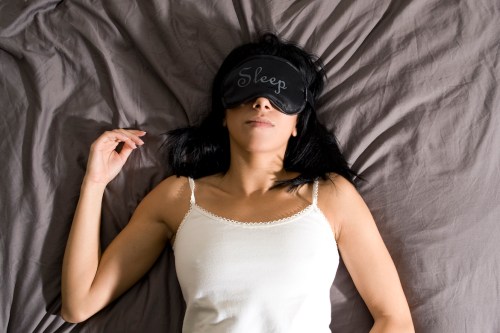I Have Sexsomia, a Disorder That’s Like Sleepwalking…but for Sex Acts
What is sexsomnia? Here, learn about the type of parasomnia characterized by engaging in sexual activity in your sleep fro sex educators.

A few years back, I spent the night at a friend’s house. We had breakfast with their family in the morning, then I left a few hours after feeling totally normal. Until later that night, that is, when my friend texted to let me know that I woke up their entire family from moaning so loud in my sleep that their parents thought we had sex (when we didn’t). Mortifying? Yup. Did I ever show my face there again? Nope. Welcome to my reality of living with sexsomnia.
Experts in This Article
sexual wellness writer and educator
sociologist and clinical sexologist at Sex Toy Collective
Sexsomnia is a rare type of parasomnia, or sleep disorder that includes abnormal behaviors or movements that manifest while falling asleep, sleeping, or waking up. According to a 2017 study published in the journal Sleep, sexsomniac behaviors may include masturbation, sexual vocalizations, spontaneous orgasm, touching a partner, initiating intercourse, and other amnesic events—and of 16,000 patients studied over the course of eight years, only 17 cases were reported.
Sexsomniac behaviors may include masturbation, sexual vocalizations, spontaneous orgasm, touching a partner, initiating intercourse, and other amnesic events.
“Most sexsomniacs experience amnesia for the event—if awoken during the act, they’re typically confused and have no memory of what occurred,” says sociologist and clinical sexologist Sarah Melancon, PhD. “When they learn of their behavior, they may feel surprise, shame, guilt, and humiliation.”
This is a departure from an erotic or “wet” dream, which is characterized by acting out in a dream. Sexsomnia, rather, is more like sleepwalking, where the sexsomniac is likely to wake up confused, with no recollection of what transpired. (With the perfect example being my embarrassment when finding out about that episode at my friend’s house.)
While my sexsomnia episodes tend to show up in the form of groggy morning masturbation sessions or the occasional sleep moaning, it can take different forms for different folks, presenting unique challenges to those who experience it and those who sleep alongside someone who does, alike.
What is sexsomnia, and what can it look like?
In short, sex educator Dainis Graveris says that sexsomnia is more of a neurologic issue than a psychiatric one (and definitely not a result of repressed sexual desires or deviant thoughts). “Deep inside your brain, you’ll find central pattern generators that loop electrical currents that produce rhythmic patterns of motor behavior and control all things primal, like eating, your fight-or-flight response, and sex,” he says of the autonomic nervous system. “Although the brain can make the switches seamlessly, switching errors are still likely to happen.” When those sleep-wake cycle switch errors happen? Enter: a parasomnia—or, depending on the person, sexsomnia—episode.
Research points to sexsomniac episodes correlating with a number of triggers, including stress, lack of sleep, poor sleeping conditions, and extreme exhaustion. “Stressful events, moderate to high levels of alcohol intake or marijuana consumption the night before, changes in one’s relationship, and physical contact with a partner while sleeping have [also] been linked,” says Melancon, noting that sexsomnia can also be associated with other past or present sleep disorders, like sleep apnea, sleepwalking, sleep talking, or teeth grinding.
And just as the likelihood of experiencing sexsomnia is super-rare, so too is the frequency of experiences, which Melacon says can span almost daily to several times per year, with some people only having one or two experiences in their lifetime. (I wake up masturbating a few times per month.) But, she adds, since “most research on sexsomnia involves case reports by patients presenting at sleep clinics,” the behavior may actually be underestimated or underreported.
What sexsomnia means for consent
Navigating consent during sexsomnia episodes can be tricky and even pose serious issues since one partner is conscious and the other is not, and the partner initiating sex play is the one who is not. “A person who suffers from sexsomnia is an unconscious person who cannot consent even if the partner asks for it,” says Graveris. “If the partner [without sexsomnia] asks and no response or conversation comes right from the unconscious person, this can be a major red flag. When a partner realizes that their partner is having sex while sleeping, they can stop the act to avoid violating the other person’s boundaries.” If you’re sleeping with a sexsomniac and feel your boundaries have been crossed, “honor your feelings, even if the behavior was not intentional,” Melancon says.
Ultimately, in order to reduce the risk of violating any boundaries and having sex without consent, even if unintentionally so, it’s important to communicate—whether you’re the sexsomniac or the person sharing a bed with one. “Communication is vital to keep the trust and consent between partners,” says Graveris, who recommends that people with sexsomnia warn partners about their condition before sharing a bed.
If you’re worried about crossing a line, even after disclosing your diagnosis, Melancon suggests sleeping in separate rooms to play it safe. “Therapy can help one or both partners deal with difficult emotions that accompany sexsomnia,” she adds. “Couples therapy may also help a couple reconnect, if desired, particularly after incidents that have unintentionally pushed boundaries or were experienced as assault.”
What to know if you think you have sexsomnia or share a bed with someone who does
Think you have sexsomnia? First off, don’t worry or feel ashamed. The condition may be rare, but it’s totally manageable. Understanding your triggers and making the necessary lifestyle changes to avoid them can help to decrease the incidence of episodes you experience. Although doctors can prescribe sleep aids or sedative drugs to reduce episodes, Graveris says it’s best to learn your triggers and start with healthier lifestyle changes, like getting regular and adequate sleep, managing your stress load, and implementing exercises and meditation techniques like yoga.
Proper education about sexsomnia is important, too, to help “the person with sexsomnia better address their condition and its triggers,” Graveris says. Armed with education, you can educate your partners so there are no midnight surprises during sleepovers.
Ultimately, it’s important to have an open conversation about sexsomnia and how it affects or can affect you and your partner(s). “Healthy communication is vital between partners to navigate this condition without becoming a source of sleep deprivation or non-consent,” says Graveris. “Keep an open mind and talk about the issue. Call it for what it is, address it, and get as much help as you need.”
Oh hi! You look like someone who loves free workouts, discounts for cult-fave wellness brands, and exclusive Well+Good content. Sign up for Well+, our online community of wellness insiders, and unlock your rewards instantly.
Sign Up for Our Daily Newsletter
Get all the latest in wellness, trends, food, fitness, beauty, and more delivered right to your inbox.
Got it, you've been added to our email list.










